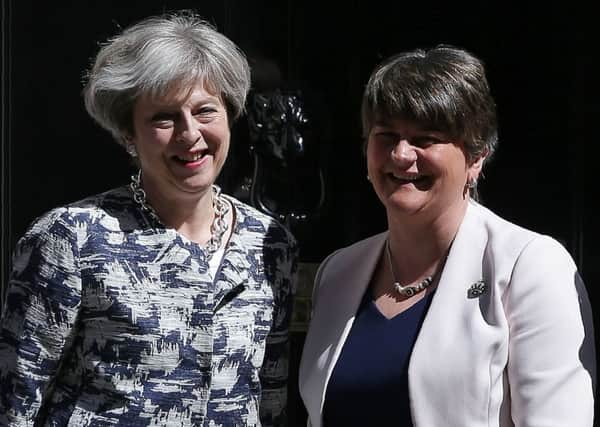Deal keeps Tories in power, but DUP could come back for more


A controversial £1 billion funding package only covers the current two-year parliamentary session, leaving the door open to additional cash being demanded in future.
Under the “supply and confidence” arrangement struck in 10 Downing Street 18 days after the 8 June general election, the DUP has guaranteed that its ten MPs will vote with the government on the Queen’s Speech, the Budget, and legislation relating to Brexit and national security.
Advertisement
Hide AdAdvertisement
Hide AdIt will give Prime Minister Theresa May just enough votes to clear the 326 level required for an absolute majority in the Commons, ensuring victory on key issues. The DUP’s support in votes not covered by the confidence and supply arrangements will be agreed “on a case-by-case basis”.
The government has ditched plans to abolish the triple-lock protection for state pensions and means-test the winter fuel payment in exchange for support from the Democratic Unionist Party, it was confirmed yesterday.
Speaking after talks in Number 10 with DUP leader Arlene Foster, Mrs May said the two parties “share many values” and the agreement was “a very good one”.
Mrs Foster said she was “delighted” with a package which includes £1bn of new funding for infrastructure and health spending, along with enhanced flexibility on almost £500 million of previously allocated cash.
Mrs Foster returned to Belfast after signing the agreement in a bid to kick-start stalled talks on restoring Northern Ireland’s suspended power-sharing executive.
A return to power sharing would see Sinn Fein and the DUP able to take joint responsibility for spending the windfall, with Nationalist leader Gerry Adams giving the deal a cautious welcome.
Mr Adams said: “We may be able to say well done Arlene, when we have the Executive in place.”
But he added: “The only fair way to get whatever resources come to this place, the only forum or the only decision-making body that can do it in a fair way is the Executive.”
Advertisement
Hide AdAdvertisement
Hide AdFollowing concerns that any deal could destabilise talks to restore devolved government in Northern Ireland, the deal says the DUP will not interfere with the government’s role as a neutral broker.
Mrs May insisted the government remains committed to the Northern Irish peace process under the terms of the Good Friday Agreement, and warned “time is running short” for parties to reach agreement to re-establish a powersharing Executive by 29 June.
“I hope the parties will look beyond their differences and come together with a shared sense of common purpose to serve all communities in the best interests of Northern Ireland,” she said. “Northern Ireland needs a functioning devolved government at this important time.”
The agreement came after lengthy negotiations which began on 9 June when the PM said she would “work with our friends and allies in the Democratic Unionist Party” to ensure the government could get its business through Parliament.
The agreement will remain in place for the length of this Parliament – due to end in 2022 – but will be reviewed each parliamentary session.
Mrs May said the agreement would “enable us to work together in the interests of the whole United Kingdom, give us the certainty we require as we embark on our departure from the European Union, and help us build a stronger and fairer society at home”.
Other features of the agreement include a shared commitment to spend 2 per cent of GDP on defence and guaranteed funding for agriculture in Northern Ireland after Brexit.
Democratic Unionist Party deputy leader Nigel Dodds slammed some of the “outrage” over the DUP deal as “hypocrisy of the highest order” as he said his party may publish its correspondence with Labour and SNP in previous general elections.
Advertisement
Hide AdAdvertisement
Hide AdSpeaking in the House of Commons, Mr Dodds said: “Someday I’d like to think we might publish all of the correspondence and conversations we had in 2010 with the Labour frontbench, and in 2015 with the Labour frontbench and indeed with the SNP as well. Because some of the full outrage that we have heard is hypocrisy of the highest order.”